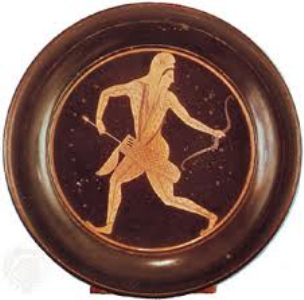
February 14, 2013, by Alan Sommerstein
The political wrestler
In the week when it has become probable that Rio de Janeiro in 2016 will see the last Olympic contests in wrestling, a sport that will have featured in 305 of the last 306 celebrations of the Games (275 ancient and 30 modern – it was omitted from the 1900 Paris programme), it seemed appropriate to commemorate an Athenian politician of the fifth century BC who was both the son and the father of outstanding wrestlers, whose own activities were often spoken of in the language of the sport (had there been political cartoonists in his time, he would certainly have been regularly imaged as a wrestler), and who had the rare privilege of being referred to favourably in a comedy without having to die first (for if proverbial wisdom was to speak no ill of the dead, the normal practice of fifth-century comedy was to speak no good of the living).
The politician was Thucydides – not the famous historian, but a distant relative who was the leading opponent of Pericles until 443 BC when he was exiled for ten years for coming top of the poll in the unpopularity contest known as “ostracism”. He returned to Athens at the end of this period, but he was now elderly, and when he was put on trial for some offence (we do not know what it was) he broke down, was unable to make any effective defence speech, and suffered a conviction which probably put an end to his public career. His father Melesias had been both a fine wrestler and a superlative wrestling trainer whose pupils won at least thirty victories at the Olympics and other major Games; and two of his sons (one of them also named Melesias) were the best Athenian wrestlers of their day. Oddly enough, Thucydides’ prosecutor in that last trial was named Euathlus, which means “good athlete”. The trial is recalled, by a chorus of old men, in Aristophanes’ play The Acharnians; Euathlus, or his father Cephisodemus, is here alleged (truly or falsely) to be of foreign descent, coming from Scythia (Ukraine) which supplied Athens with its bow-wielding slave police force.
Can it be right that someone old and bending,
Like poor Thucydides, should be contending
Against that “Scythian wilderness”, the young
Son of Cephisodemus, glib of tongue?
I pitied him, I wiped the tear-drops back,
To see that archer harry him to wrack.
When he was younger, he’d have been defiant,
He’d not have stood such insults from a giant!
No, ten times he’d have wrestled down that fellow,
Silenced three thousand Scythians with his bellow,
And proved himself a better archer than
Cephisodemus’ son and all his clan. (trans. A.H. Sommerstein, London [Penguin] 2002)
No comments yet, fill out a comment to be the first

Leave a Reply